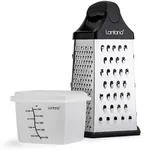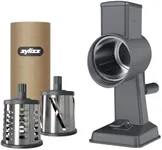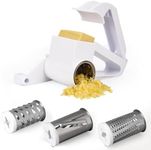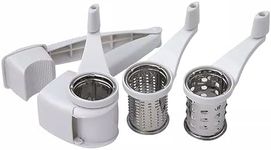Buying Guide for the Best Cheese Graters
Choosing the right cheese grater can make a big difference in your kitchen experience. Whether you're grating cheese for a pizza, pasta, or salad, the right grater can make the task easier and more efficient. When selecting a cheese grater, consider the types of cheese you typically use, the frequency of use, and your storage space. Different graters offer various features that can cater to specific needs, so understanding these can help you make an informed decision.Type of GraterCheese graters come in several types, including box graters, rotary graters, microplane graters, and electric graters. The type of grater you choose depends on your needs. Box graters are versatile and can handle a variety of grating tasks, making them ideal for general use. Rotary graters are great for hard cheeses and are easy to use with minimal effort. Microplane graters are perfect for fine grating, such as zesting or grating hard cheeses like Parmesan. Electric graters are suitable for those who grate large quantities of cheese frequently. Consider what you will be grating most often and choose a type that suits your needs.
MaterialCheese graters are typically made from stainless steel, plastic, or a combination of both. Stainless steel graters are durable, rust-resistant, and provide a sharp grating surface, making them a popular choice for most users. Plastic graters are lightweight and may be easier to handle, but they might not be as durable as stainless steel. If you need a grater for heavy-duty use, stainless steel is the way to go. For occasional use or if you prefer a lighter tool, a plastic grater might suffice.
Grating SurfaceThe grating surface refers to the size and shape of the holes on the grater. Different surfaces are designed for different tasks. Coarse surfaces are ideal for shredding cheese for salads or tacos, while fine surfaces are better for grating cheese for sauces or garnishes. Some graters offer multiple surfaces, providing versatility for various tasks. Consider what you will be using the grater for most often and choose a grating surface that matches your needs.
Ease of CleaningCleaning a cheese grater can be a hassle, especially if cheese gets stuck in the holes. Some graters are dishwasher safe, which can make cleaning easier. Others may require hand washing. If you prefer low-maintenance kitchen tools, look for a grater that is easy to clean or dishwasher safe. Consider how much time you are willing to spend on cleaning when choosing a grater.
Size and StorageThe size of the cheese grater can affect how easy it is to store and use. Larger graters may offer more grating surface but can be bulky and take up more storage space. Smaller graters are easier to store but may not be as efficient for large quantities of cheese. Consider the space you have available in your kitchen and how often you will be using the grater. If space is limited, a compact grater might be more suitable.


















